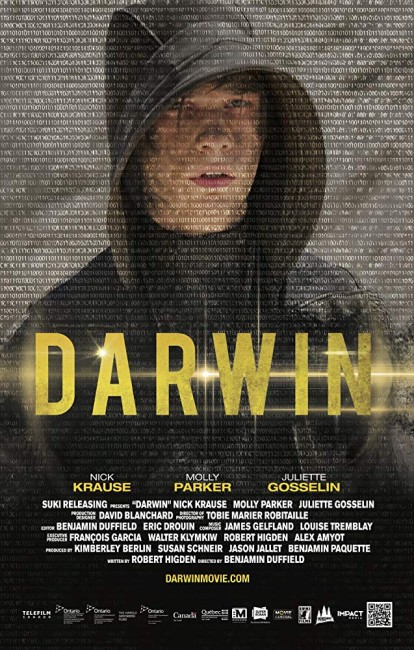aka Confinement; 2149: The Aftermath
Canada. 2016.
Crew
Director – Benjamin Duffield, Screenplay – Robert Higden, Producers – Kimberley Berlin, Jason Ross Jallet, Benjamin Paquette & Susan Schneir, Photography – Tobie Maier-Robitaille, Music – James Gelfand & Louise Tremblay, Visual Effects – Intelligent Creatures (Supervisor – Mike Sevigny), Production Design – David Blanchard. Production Company – ESC QC/ESC ON Productions.
Cast
Nick Krause (Darwin), Juliette Gosselin (Dara), Molly Parker (Lillian), Jordyn Negri (Beth), Colleen Giles (Darwin’s Mother)
Plot
In the future, people have become so absorbed in communicating via computer and living in their virtual worlds, that they live in cubicles no longer talking to one another in person. The teenage Darwin lives in a cubicle where he works remotely piloting a bulldozer. One day, the power systems in his cubicle fail. With air supplies running out, he is forced to exit into the outside world for the first time. He is bewildered by the new experiences. He is then found by a group of people led by Lillian who live back to nature in the woods. Among this group, Darwin is attracted to a girl Dara and learns to speak again after having forgotten how to do so. Meanwhile, the security forces have sent drones to search for and recapture him.
Darwin is a dystopian film – a subgenre of science-fiction that deals with the depiction of a nightmare future. This is a genre that has a long history in literature. Film variants range from the likes of Metropolis (1927), Fahrenheit 451 (1966), THX 1138 (1971), Zardoz (1974), Rollerball (1975), Logan’s Run (1976) and Brazil (1985) to more recent takes such as Gattaca (1997), Code 46 (2003), V for Vendetta (2006) and the Hunger Games and Divergent films.
The central idea of every dystopian work is the projection of a particular contemporary social trend imagined taken to its logical, nightmarish (or sometimes satirical) extreme. Each of these reflects the author’s particular concerns – in Fahrenheit 451 (1953), Ray Bradbury feared the death of the imagination and literature; in THX 1138, George Lucas feared the loss of individuality; in Atlas Shrugged (1957), Ayn Rand feared socialism; Demolition Man (1993) worried about Political Correctness taking over and so on. The fear at work in Darwin is of contemporary absorptions in the internet, gaming, mobile communication and social media. The script imagines this taken to a nightmare extreme – from the opening title card, we are told that people spend most of their lives online and then we see that two generations onwards this has a resulted in a society where people live in isolated cubicles and only communicate with one another via computer.
There is a certain idea here – a somewhat similar one was conducted in the Fifteen Million Merits (2011) episode of Black Mirror – but it is one that I don’t think Darwin does a huge amount to either address or make it seem credible. There are undeniable moments of cleverness – I did like the evolved and condensed text language that the film creates and even the clothing where keypads have become part of the fabric.
On the other hand, the film leaves you with a large number of questions. If people are isolated in cubicles and only communicate via computer, how do they meet to have children as Darwin’s mother clearly has to have done at some point in her life? How is it that people who spend all their lives on chairs in cubicles are not 600-pound blobs with atrophied muscles? How does someone who has no experience of a shower maintain a hygiene habit? Most of all, how does someone ‘forget’ to speak? I mean, we hear computers speaking aloud throughout, Darwin is able to read the text and write so he has to have learned the rudiments of language somewhere along the line.
Darwin‘s credibility problems don’t end there. As soon as he leaves his cubicle, Darwin is introduced to a society living in the wild who take him into their midst where he begins a painfully cliched awakening to his true human nature. The society of Back to Nature people is no less convincing. They seem very clean, idyllic and healthy for people who would have no technology or electricity, no medicine, no processed foods. You keep asking questions about the world they live in. How do they obtain food? They wear clothing that very clearly can be seen with machine-sewn seams so where would this come from? What about the marauders, animal predators and inclement weather they would face in the wild apparently living with only a single shelter that is open on all sides? For that matter, in that they only live about a mile from the city, how do they avoid detection by the drones?
Darwin is a Luddhite film. It creates an absurd straw debate – complete internet addiction versus Back to Nature lovers. It’s an absurd argument because it sees no middle ground. It is one where the internet, use of social media and mobile devices equals slavery to the machine and social isolation compared to a return to nature free of technology, which equals freedom and authentic connection with one’s humanity. There seems no middle ground or alternate position such as that living back to nature might actually be a dangerous experience and involve a great deal of hard work. Or for that matter the use of the internet might actually be a positive thing – for example, I have connected with friends I haven’t seen for more than twenty years on social media and can log on and talk to more people all over the world at one time than I ever could in real life. Is that really being socially isolated? Like any sensible person, I am also perfectly capable of turning the computer off when I want to go out and socialise face to face.
Trailer here


